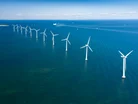Vestas, NCC and BCI: Driving UK's Offshore Wind Development

The British Energy Security Strategy (BESS) published in April 2022, sets out big clean energy ambitions for the UK.
These include the goal of achieving up to 50 gigawatts of offshore wind by 2030, five gigawatts of which will be sourced from innovative floating technology.
The UK is the second largest offshore wind market in the world. The UK Offshore Wind Industrial Growth Plan estimates the domestic economic opportunity of the sector will be worth up to a staggering £92bn (US$119.48bn) by 2040.
Meeting these ambitions would have a transformative impact on the future of offshore wind development, the clean energy transition and the nation's manufacturing sector.
This transformative potential is being touted by none other than the UK's Prime Minister, Kier Starmer.
Yesterday he and the government hosted the International Investment Summit, designed to show that Britain is open to business, which was attended by significant leaders across global manufacturing.
At the summit, offshore wind loomed large, with the Prime Minister highlighting the UK's clean energy potential to court billions in investments.
This aligns with Labour's broader Industrial Strategy, where delivering clean power by 2030 across the industry is a pivotal goal.
The inertia & opportunity of UK offshore wind
Pledging to "rip up" the red tape of bureaucracy for offshore wind developers, Sir Kier Starmer voiced criticism of the "volume and inconsistency" of planning and regulatory requirements, which he argues have blocked investment in the sector.
“This is an important project for the UK that we need to replicate again and again,” he said at the International Investment Summit.
“However, as an investor, when you see that sort of inertia, you don’t bother – do you?”
The Prime Minister cited the two-year delay to ScottishPower Renewables’ 960MW East Anglia 2 wind farm off East England as an example of this intertia.
The delay was caused by a judicial review, which required more than 4,000 documents to be submitted in order for the company to secure a Development Consent Order to build its 75-turbine array.
But overcoming this inertia is just one step of securing the future of UK offshore wind.
The industry needs advanced product and technology development to enable greater sustainability and reduce energy costs.
This will subsequently increase the number of manufacturing jobs and export opportunities across the nation's supply chain, maximising market potential.
Vestas, NCC & BCI: A strategic alliance
Working to accomplish all these steps and more is leading manufacturer Vestas, the National Composites Centre (NCC) and Bristol Composites Institute (BCI).
In the process of establishing it's long-awaited offshore wind project in Scotland, Vestas is a renowned leader in wind turbine blade manufacturing.
NCC and BCI are prominent research institutions, with NCC delivering sustainable manufacturing solutions for offshore wind through the SusWIND programmes and Joule Challenge.
Together these organisations have established a multi-year strategic technology research partnership that will drive manufacturing and energy innovation.
The partnership will have a primary focus on accelerating wind blade technological development, 'propelling' the UK's status as a clean energy superpower.
“The National Composites Centre and Bristol Composites Institute bring together excellence in research and collaboration with industry, making them ideal partners for companies like Vestas that depend on the newest composite material and manufacturing knowledge," says Kasper Roed Jensen, Vice President of New Concepts at Vestas R&D.
"NCC, BCI and Vestas have grown together and Vestas is excited to take the next step through a strategic R&D partnership. We look forward to working together through our UK and Danish R&D teams on the next generation of sustainable energy solutions.”
Richard Oldfield, Chief Executive, National Composites Centre expresses similar excitement about the partnership.
“We are delighted to be selected as a global technology partner of Vestas," he says.
"The National Composites Centre is leading efforts to advance ‘green industry’ technologies, including for next generation wind applications.
"I look forward to continuing our work with Vestas to accelerate the path to net zero.”
The Bristol Composites Institute (BCI) has collaborated with Vestas since the early 2000s.
The team there also expresses a bold commitment to the future of UK renewables and green manufacturing.
“The Bristol Composites Institute is honoured to have been confirmed as a partner by Vestas and elevated to strategic status," says Alberto Pirrera, Professor, Bristol Composites Institute, University of Bristol.
"We look forward to working closely with Vestas on pioneering research and technological innovations that will advance the wind energy sector and contribute to a more sustainable future.”
Make sure you check out the latest edition of Manufacturing Digital and also sign up to our global conference series - Manufacturing & Mobility LIVE
Manufacturing Digital is a BizClik brand
- Henkel: Optimising Washing Through Autonomous SensorsSustainability & ESG
- BMW: Creating Economic Circularity through Battery CreationSustainability & ESG
- Aggreko: UK Energy Manufacturers must Shore Up Supply ChainSustainability & ESG
- Capgemini: Gen AI Cause of Spiking Semiconductor DemandAI & Automation

